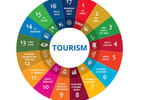The United Nations today declared a famine in three more areas in drought-ravaged Somalia, bringing to five the number of regions in the Horn of Africa country where acute malnutrition and starvation have already claimed the lives of tens of thousands of people.
The UN Humanitarian Coordinator for Somalia, Mark Bowden, said the Afgoye corridor outside Mogadishu, the capital itself, and the Middle Shabelle region are now in a state of famine. On 20 July the UN declared outright famine in Lower Shabelle and in southern Bakool region.
A famine can be declared only when certain measures of mortality, malnutrition and hunger are met. They are: at least 20 per cent of households in an area face extreme food shortages with a limited ability to cope; acute malnutrition rates exceed 30 per cent; and the death rate exceeds two persons per day per 10,000 persons.
The spread of the famine conditions highlights the seriousness of the food crisis facing internally displaced persons (IDPs) in Mogadishu. The declaration of famine in the capital follows the massive influx of starving adults and children into the city in the past two months.
The UN Office for the Coordination of Humanitarian Affairs (OCHA), meanwhile, said that the appeal for funds to respond the hunger crisis in the Horn of Africa region, including Ethiopia, Somalia, Kenya and Djibouti, is still only 44 per cent funded, with an additional $1.4 billion still required to cover unmet needs. An estimated 12.4 million people in the entire region are in need of assistance, according to OCHA.
In the Dadaab complex of refugee camps in Kenya – whose population has swelled to nearly 380,000 in recent months, including 40,000 arrivals from Somalia last month alone – the UN High Commissioner for Refugees (UNHCR) reported that mass screening for malnutrition conducted in two of the camps in July revealed alarmingly high rates of acute malnutrition.
The agency has transferred more than 10,500 recent Somali arrivals to Dadaab’s Ifo camp extension in an ongoing relocation operation. UNHCR has airlifted thousands of tents to Kenya to accommodate the refugee population, but an additional 45,000 tents are still needed as the influx continues. The agency also voiced concern that Dadaab’s water resources could soon be overstretched.
In a related development, the Special Representative of the Secretary-General for Somalia, Augustine Mahiga, appealed to all Somalis, both inside and outside the country, to work together to support the ongoing peace process and alleviate the plight of those suffering from famine.
“This is a time of great crisis, but also of rare opportunity. It is a time for everyone to pull together to help those suffering and to work towards a better future for all,” said Mr. Mahiga in a letter to the Somali diaspora.
“I appeal to all those who are able – Somalis and the international community alike – to give as much as they can during this Holy Month to feed the hungry, heal the sick and prevent the famine spreading further,” he stated, referring to the Islamic fasting month of Ramadan that began on Monday.
Mr. Mahiga noted that despite recent progress on the political front, one of the contributing factors to the famine has been the ongoing fighting in the country. Some of the extremists are continuing their efforts to intimidate the population by preventing the movement of people from the worst-hit areas, he said.
“We call for the humanitarian agencies to be given unhindered access to all areas to provide desperately needed help,” he wrote, adding that the insecurity in many areas means that aid workers take huge risks to make their life-saving deliveries.
WHAT TO TAKE AWAY FROM THIS ARTICLE:
- “I appeal to all those who are able – Somalis and the international community alike – to give as much as they can during this Holy Month to feed the hungry, heal the sick and prevent the famine spreading further,” he stated, referring to the Islamic fasting month of Ramadan that began on Monday.
- In the Dadaab complex of refugee camps in Kenya – whose population has swelled to nearly 380,000 in recent months, including 40,000 arrivals from Somalia last month alone – the UN High Commissioner for Refugees (UNHCR) reported that mass screening for malnutrition conducted in two of the camps in July revealed alarmingly high rates of acute malnutrition.
- In a related development, the Special Representative of the Secretary-General for Somalia, Augustine Mahiga, appealed to all Somalis, both inside and outside the country, to work together to support the ongoing peace process and alleviate the plight of those suffering from famine.






















